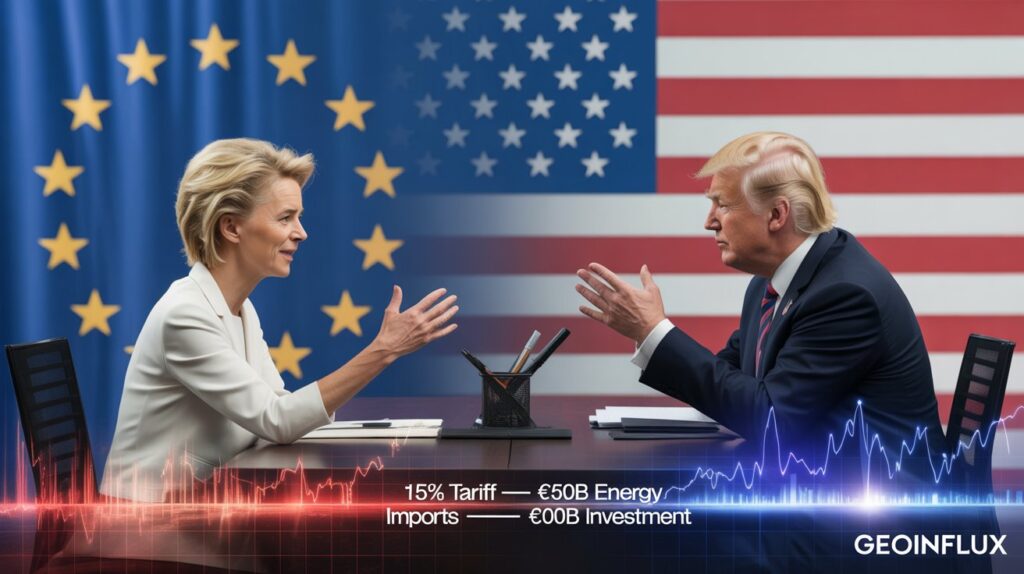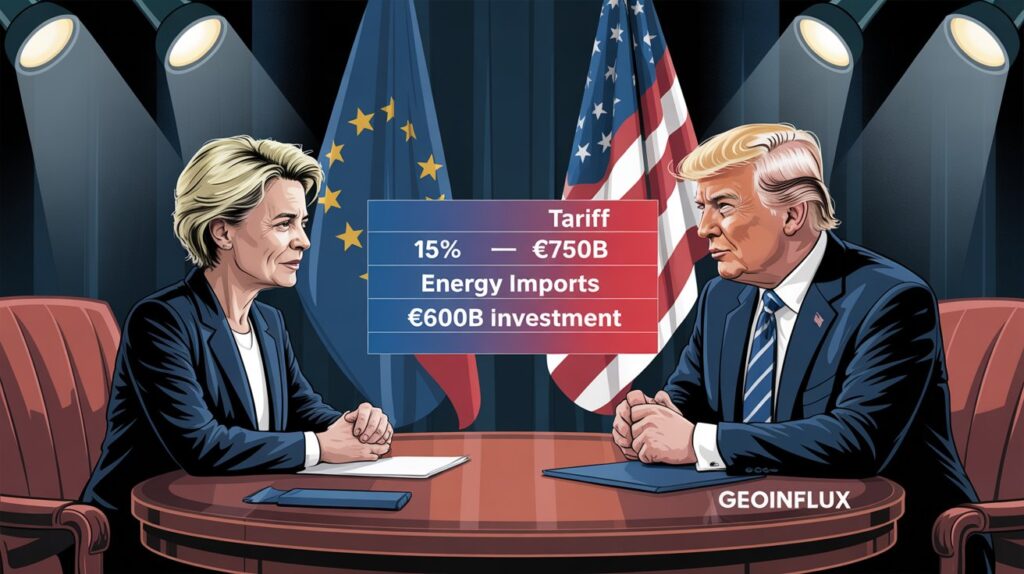BRUSSELS, BELGIUM – In a move that could redefine transatlantic trade, the newly announced EU–US trade deal—signed by US President Donald Trump and EU Commission President Ursula von der Leyen—has ignited sharp divisions across Europe.
While intended to stabilise EU–US economic relations, critics are calling it a lopsided agreement that could weaken Europe’s global standing and spark internal fragmentation within the bloc.
🔍 EU–US Tariffs: From Zero to 15% – A Trade War Averted or Sovereignty Undermined?
At the core of the controversy lies a 15% tariff imposed by the United States on EU exports—an abrupt reversal from earlier proposals of a “zero-for-zero” tariff model.
In return, Washington is granted preferential EU market access, raising questions over the legality under WTO rules and the fairness of the pact.
The EU, on its part, has agreed to:
- Invest €600 billion in the US economy
- Import US energy worth €750 billion over 3 years
These massive economic commitments mark a strategic shift for the European Union, increasing dependence on American energy and diverting European capital across the Atlantic.
Notably, these concessions starkly diverge from the EU’s original negotiating posture, which aimed at more balanced reciprocity.
⚠️ Macron Blasts ‘Capitulation’: Was Brussels Pushed into a Corner?
French President Emmanuel Macron has emerged as one of the fiercest critics, branding the deal a “strategic surrender.”
Macron argues that the European Commission should have taken a tougher stance, potentially retaliating with EU tariffs of its own to extract more concessions from Washington.
“The United States barely gave anything in return,” Macron stated, “yet we gave billions and bent our energy sovereignty.”
Adding to the drama, President Trump had issued a 30% tariff threat in a last-minute letter unless a deal was finalized before August 1st. This high-pressure tactic is seen by many as having cornered Brussels into accepting terms it would have otherwise rejected.
🧩 Von der Leyen’s Defense: Strategic Realism or Political Cover?

Amid mounting backlash, President Ursula von der Leyen defended the deal as “pragmatic and necessary.”
- With existing US tariffs already at 27.5%, she argued the new 15% level was “better than a 30% cliff.”
- Brussels cited a “need to avoid a full-blown trade war with the United States”, given Europe’s fragile economic state.
- Politically, maintaining US support for Ukraine was framed as a top priority—suggesting that trade concessions were the price for geopolitical unity.
“We had to preserve the transatlantic alliance,” an EU spokesperson said, hinting at behind-the-scenes geopolitical tradeoffs.
🧠 German Scholz Backs Deal: Prioritizing Stability Over Sovereignty
Interestingly, not all voices in Europe are critical. German Chancellor Olaf Scholz welcomed the deal, arguing that for export-driven economies like Germany, removing uncertainty was more vital than resisting higher tariffs.
“We can now plan. Investors can now commit. That’s worth something.”
This view reflects the internal divisions within the EU, where southern and eastern member states may prioritize sovereignty and balance, while industrial powerhouses like Germany favor predictability and trade continuity.
❗ Unsettled Legal and Economic Questions Cloud the Deal’s Future
Even as the ink dries, legal experts warn that the EU–US trade deal may breach WTO rules:
- Granting preferential EU market access to the US without equal reciprocity could trigger international trade disputes.
- The European Commission cannot legally guarantee the €750 billion in US energy purchases or the €600 billion in private-sector investment—raising doubts about the enforceability of key terms.
This opens a new front of criticism: Has Brussels promised what it cannot deliver?
“The Commission does not control private capital. These numbers are aspirational at best,” said a trade law scholar in The Hague.
🔄 Strategic Implications: Is Europe Ceding Economic Ground for Political Unity?
The broader concern is whether this deal signals a paradigm shift in how the EU balances economic autonomy with geopolitical loyalty—especially in the context of:
- Maintaining transatlantic unity over Ukraine
- Navigating US protectionism and election-year uncertainty
- Managing rising global trade law tensions
Analysts suggest that the EU’s global negotiating credibility could be at stake if member states view this deal as precedent for future unilateral concessions to Washington or Beijing.
✅ Conclusion: A Deal Signed, But Far from Settled
The EU–US trade deal, while presented as a diplomatic win, has instead spotlighted the growing fragility of EU trade sovereignty, legal ambiguities, and uneven internal consensus.
With Donald Trump’s aggressive US trade policy framing the terms and Ursula von der Leyen’s Commission absorbing the political fallout, this deal could reshape the EU’s economic and geopolitical future.
As Brussels moves to implement the agreement, legal scrutiny, political resistance, and business uncertainty are likely to persist.
📊 Summary Recap Table
| Element | Details |
|---|---|
| Tariff Level | 15% on EU exports to US |
| EU Investment in US | €600 billion (private sector) |
| Energy Imports from US | €750 billion (over 3 years) |
| Trump’s Tariff Threat | 30% by Aug 1 if no deal |
| EU Internal Divide | France opposes, Germany supports |
| WTO Rule Violation? | Possible legal challenge |
| Geopolitical Trade-Off | Ukraine unity over tariff equality |
❓FAQs – EU–US Trade Deal and Transatlantic Trade Strategy
1. What is the EU–US trade deal about?
It’s a new agreement imposing a 15% tariff on EU exports to the US while opening the EU market to more American goods, energy, and investment.
2. Why is the EU–US trade deal controversial?
Critics argue it is one-sided, with massive EU concessions and few reciprocations from the US, possibly violating WTO rules.
3. Did Donald Trump threaten the EU before the deal?
Yes, he issued a warning of a 30% tariff if the deal wasn’t reached by August 1.
4. What are the risks to WTO compliance?
The deal may breach WTO rules by giving the US privileged access without full reciprocity.
5. Can the EU deliver on €750B energy imports from the US?
Unlikely in full, as the funds depend on private sector decisions, not EU control.
🔗 Related Articles on GeoInflux.com
- Breaking: Donald Trump India Pakistan War Claims Resurface, 5 Alarming Facts Fueling Global Tensions
- NATO Warns India: 50-Day Ultimatum Could Trigger Global Fallout
📚 References
- DW News on Macron Criticism
- European Commission Press Briefing
- WTO Agreements & Trade Rules
- Reuters: Trump’s Tariff Threat
- Politico: Breakdown of Trade Commitments





We’re a group of volunteers and starting a new scheme in our community. Your website provided us with valuable info to work on. You’ve done a formidable job and our entire community will be grateful to you.
I do believe all the ideas you’ve introduced for your post. They’re very convincing and can certainly work. Nonetheless, the posts are too brief for novices. May just you please extend them a bit from next time? Thanks for the post.
Some really fantastic work on behalf of the owner of this website , absolutely outstanding subject matter.